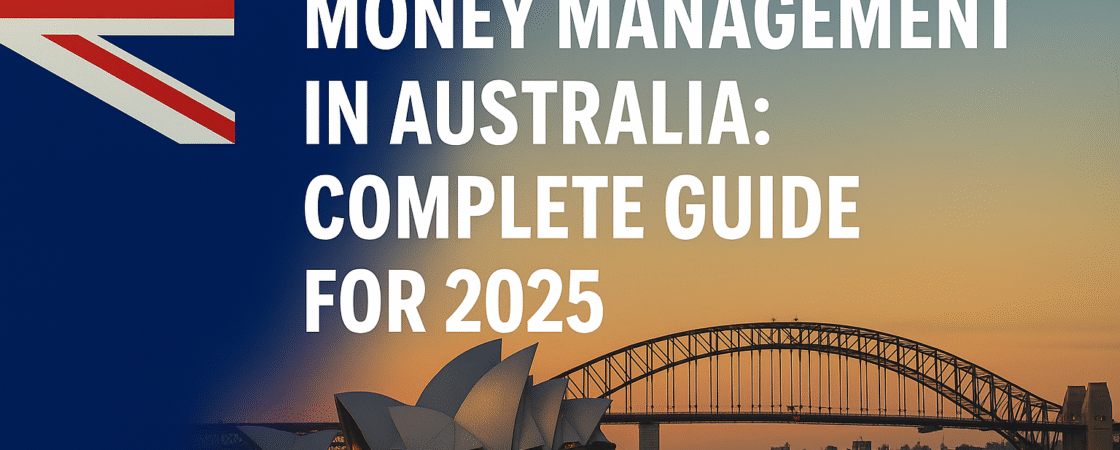Managing money effectively in Australia is crucial due to rising living costs, high property prices, and increasing financial responsibilities. Australians need smart strategies to budget, save, invest, and reduce debt while planning for retirement. Money management is not just about cutting expenses; it’s about creating a financial system that balances lifestyle needs with long-term goals. From budgeting tools to investment platforms, Australia offers multiple options for individuals to stay financially secure. Below are 10 detailed topics on effective money management in Australia:
1. Importance of Money Management in Australia 2025
Money management is essential for achieving financial stability, avoiding debt, and reaching personal goals like homeownership, education, or early retirement. Proper money management helps Australians handle unexpected expenses, plan for emergencies, and grow wealth over time. Financial literacy is key—understanding banking, investments, and insurance helps individuals make informed decisions.
2. Budgeting Strategies for Australians
Budgeting is the foundation of money management. Popular methods include:
- 50/30/20 Rule – 50% needs, 30% wants, 20% savings/debt repayment.
- Zero-Based Budgeting – Assign every dollar a purpose.
Tools like ASIC’s MoneySmart Budget Planner (Visit MoneySmart) and apps like Pocketbook help Australians track spending and control expenses.
3. Emergency Funds and Savings Plans
An emergency fund protects against unexpected expenses like medical bills or job loss. Experts recommend saving 3–6 months’ worth of living expenses. High-interest savings accounts (HISAs) from banks like Commonwealth Bank and ING offer competitive rates. Australians should also set short-term and long-term savings goals for holidays, education, and home deposits.
4. Debt Management and Credit Score Improvement
Debt can quickly derail financial plans if unmanaged. Australians often face credit card debt, personal loans, and mortgages. Strategies to reduce debt include:
- Debt Snowball Method – Pay off smallest debts first.
- Debt Avalanche Method – Pay off highest-interest debts first.
Maintaining a good credit score improves access to loans at lower interest rates. Tools like Credit Savvy and MoneySmart’s debt calculators assist in planning repayments.
5. Saving for Big Goals: Home and Education
Buying a home or funding higher education requires disciplined saving. Australians can benefit from the First Home Super Saver Scheme (FHSSS) to save for a deposit through super contributions. Education savings plans and investment accounts help parents prepare for children’s schooling costs. Using offset accounts linked to home loans also reduces interest payments and speeds up mortgage repayment.
6. Superannuation and Retirement Planning
Superannuation is a compulsory retirement savings plan in Australia, with employers contributing 11% of an employee’s salary. Australians can make extra contributions (concessional or non-concessional) for tax benefits and higher retirement savings. Reviewing fund performance and consolidating multiple accounts is crucial for maximizing growth. Compare Super Funds on MoneySmart (Check Here).
7. Investing for Wealth Growth
Investment plays a major role in money management. Australians can invest in:
- ASX Shares and ETFs for long-term growth.
- Managed Funds for diversified exposure.
- Real Estate for rental income and capital appreciation.
Platforms like CommSec, SelfWealth, and robo-advisors make investing easier. Understanding risk tolerance and setting realistic goals are key to successful investing.
8. Smart Spending and Avoiding Lifestyle Inflation
Australians often struggle with lifestyle inflation—spending more as income increases. Strategies to avoid this include setting strict budgets, automating savings, and prioritizing needs over wants. Using cashback apps like ShopBack and loyalty programs helps reduce everyday expenses without sacrificing quality of life.
9. Using Financial Tools and Apps for Money Management
Technology simplifies financial management in Australia. Popular tools include:
- MoneyBrilliant – Budgeting and bill tracking.
- Frollo – Open banking app for all accounts.
- PocketSmith – Cash flow forecasting.
These apps provide real-time tracking, spending analysis, and goal setting, making it easier to stick to financial plans.
10. Financial Planning and Professional Advice
A financial planner can help Australians create personalized strategies for savings, investments, and retirement. Ensure the planner is registered with ASIC’s Financial Adviser Register. Professional advice becomes essential for complex needs like tax planning, estate planning, and wealth management.
✅ Explore Money Management Tools: Visit MoneySmart Australia
✅ Compare Best Budgeting Apps: Pocketbook App

11. Importance of Money Management in Australia
Effective money management allows Australians to meet short-term needs while working toward long-term goals like home ownership, retirement savings, and education funds. Poor management often leads to debt stress, missed bills, and lack of savings. Building financial discipline helps avoid unnecessary debt and ensures a comfortable lifestyle.
Read more about Financial Planning in Australia
12. Budgeting Techniques for Australians
Budgeting is the foundation of money management. Popular methods in Australia include the 50/30/20 rule, where 50% of income goes to needs, 30% to wants, and 20% to savings or debt repayment. Apps like Pocketbook, Frollo, and MoneyBrilliant help track spending and set financial goals.
Check Top Budgeting Tools in Australia
13. Managing Everyday Expenses
Cost of living in Australia is high, especially in cities like Sydney and Melbourne. Australians can manage expenses by reducing utility bills, cooking at home, using public transport, and shopping during discounts. Comparison websites like Compare the Market help find the best deals on insurance, energy, and internet.
Compare Services and Save Money
14. Building an Emergency Fund
An emergency fund is essential for unexpected expenses such as medical bills, car repairs, or job loss. Financial experts recommend saving at least 3–6 months of living expenses. High-interest savings accounts from banks like ING and UBank offer competitive interest rates for emergency funds.
Find Best High-Interest Savings Accounts
15. Reducing and Managing Debt
Australians often carry mortgage, personal loan, and credit card debts. Strategies for managing debt include debt consolidation, snowball method, and negotiating lower interest rates. Avoiding unnecessary Buy Now Pay Later (BNPL) debt from services like Afterpay and Zip is also crucial.
Learn Debt Management Tips on MoneySmart
16. Saving for Retirement with Superannuation
Superannuation plays a critical role in long-term money management. Australians should review their super regularly, consolidate multiple accounts, and make extra contributions to boost retirement savings. Comparing super fund performance ensures better returns over time.
17. Smart Investing for Wealth Growth
Investing is key to building wealth. Australians can invest in ASX-listed shares, ETFs, managed funds, and real estate. Using robo-advisors like Raiz or Spaceship Voyager can help beginners start with small investments. Always diversify to minimize risk.
Compare Investment Platforms in Australia
18. Credit Score and Its Role in Money Management
A good credit score helps secure loans at better interest rates. Australians can check their credit report for free through agencies like Equifax, Experian, and illion. Paying bills on time and keeping credit card balances low are key to maintaining a healthy score.
Check Your Credit Score in Australia
19. Managing Finances as a Family
Family budgeting includes planning for education, housing, healthcare, and entertainment. Australians can use joint accounts, set shared savings goals, and review family expenses monthly. Involving kids in budgeting teaches them financial responsibility early.
Family Finance Tips on MoneySmart
20. Financial Planning with Professional Help
Sometimes, expert advice is necessary for tax planning, investments, and retirement strategies. Australians can hire a licensed financial planner through the Financial Adviser Register by ASIC. Always check credentials and fees before engaging a financial adviser.
Find a Financial Adviser in Australia
✅ Explore More on Budgeting and Money Management:
Visit MoneySmart – Australian Government Financial Guide
✅ Compare Top Banks and Financial Products in Australia:
Click Here to Compare Banking Options




جمهوری اسلامی ایران